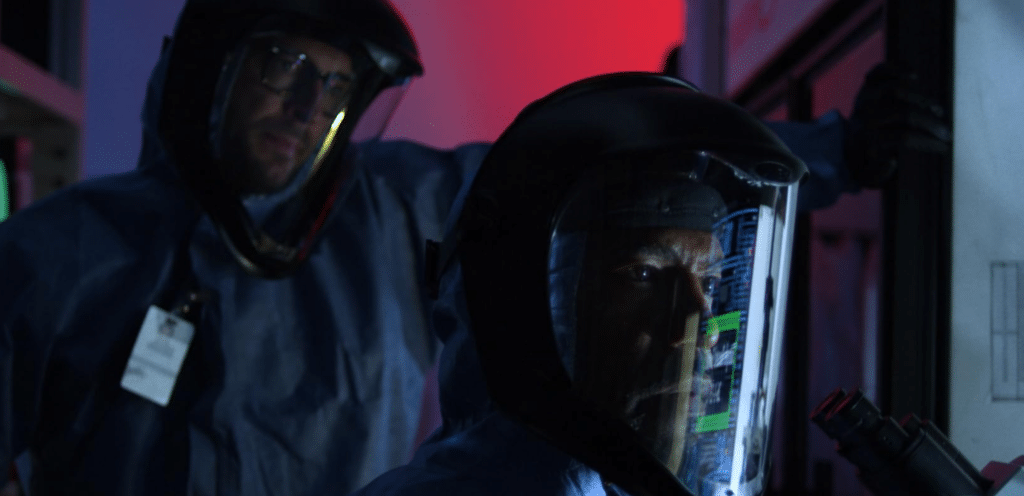
Short film Vax (2023) is a cynical snapshot of the interplay between medical research and a profits-driven system, and one which has clearly bubbled away in the aftermath of the Covid-19 vaccine, with all of its attendant, sometimes barking mad discourse. But what Covid did was bring the subject of vaccination to the fore; whether you happen to believe that the Covid vaccine programme was a profit-driven ploy by Big Pharma to implant us with nanotechnology or a successful tool in quelling a new and often highly dangerous type of coronavirus, vaccination has been a hot topic in recent years in ways it hasn’t been for many more years than that.
But Vax doesn’t actually tackle Covid; rolling time back to 2003 (with a newsreel first reminding us of early Noughties Republican spending cuts and the run-up to the second Iraq war) it bookends its broadcast with mention of the impact of malaria, particularly in sub-Saharan Africa where the insect-borne virus typically thrives, killing tens of thousands of people per year – especially children. The search for a viable malaria vaccine has been a long and arduous one (and, somewhat gallingly for the film’s premise, has recently resulted in an effective, cheap, lifesaving vaccine which has now been rolled out worldwide). However, the film is set twenty years ago and, in its world, the hunt for a vaccine is ongoing.
It’s just that the potential success noted by scientist Geoff (Cade Carradine) is at first doubtful, because it seems to be entirely accidental. Examining one of a range of petri dishes one day to check progress on a sample, he sees that the malaria microbe is…gone. Perhaps there’s been an oversight? He looks again. The angry reaction of his colleague Eric (Ricco Ross) seems unusual, honestly, but perhaps he really is disturbed by the possibility of a professional error at this level; contamination, or human error, could (we infer) cost a lot of money to the lab. Politics begins to creep in – I say creep, but it’s a bit more overt than that, with a hefty insinuation that the lab should conceal any success in this endeavour because of market considerations. So what does a lone scientist, motivated by philanthropy, decide to do in this situation?
The interplay between public funding, private enterprise and pharmaceutical development is vast, complex and often nigh-impossible to decipher without banging your head against an alternative piece of evidence here, a different explanation there; in effect, it makes for challenging subject matter for a twelve minute film, and any conclusions must be curtailed in terms of complexity, or subtlety. Nonetheless this is a carefully-shot film, well lit, with an appealing balance of colour against lots of darkness; characters appear in shadow, discussing big ideas in barely-illuminated spaces. It gives the film a nicely theatrical quality, and its use of green-screen is just as considerate.
In terms of subject matter and politics, Vax doesn’t attempt to get much further than highlighting the decided downsides of medical breakthroughs happening in the wrong hands, but hey, this has happened out in the real world and may continue to happen, so – as a talking point, the short film does enough to raise this central idea and leave it with us. It’s a decently made calling card by director Barak Shpiez.
